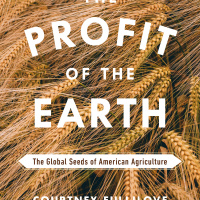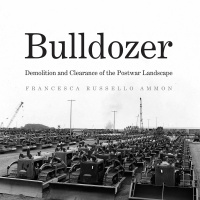Stories From The Stacks
- Author: Vários
- Narrator: Vários
- Publisher: Podcast
- Duration: 79:48:23
- More information
Informações:
Synopsis
Podcast by Hagley Museum and Library
Episodes
-
The DuPont Company's Entry into the Dynamite Business Out West
20/07/2018 Duration: 29minSeth Lunine (lecturer in the Geography Department at University of California, Berkeley) explores the history of the high explosives industry in California and DuPont's eventual acquisition of many of these West Coast Companies. Lunine explains that he saw a hole in the historical research and discovered that the high explosives industry began in the west and came east.
-
The Sportswomen Who Picked Up Guns In A Man's Shooting World
06/07/2018 Duration: 26minIn this episode, Mallory Huard (Ph.D. candidate in history and women’s studies at the Pennsylvania State University) introduces us to the women who picked up rod and gun as part of the Progressive Conservation movement, and how they were depicted in images, advertisements, magazines, and newspapers. More info: www.hagley.org/stories
-
The Global Seeds of American Agriculture with Courtney Fullilove
28/06/2018 Duration: 44minIn this author talk, which took place at the Hagley Library on May 10, 2018, Wesleyan history professor Courtney Fullilove explains how Turkey Red Wheat became the predominant variety planted in the U.S. Great Plains in the late 19th century — the breadbasket of the world at the time. She explains how both plant explorers and Mennonite farmers helped transplant this important product, demonstrating that, far from being remote backwaters, the wheat-growing regions of the world have been connected in highly cosmopolitan ways.
-
Escape from New York: How Urban Workers Relaxed in the 19th Century City
22/06/2018 Duration: 29minWhat did urban workers do for fun in the 19th century? With not a lot of money, a grueling work schedule, and only Sundays off, it could be difficult to escape the routines of the city and its toil. In this episode, Marika Plater (Ph.D. candidate in history at Rutgers University) digs deep into the archives to get at how working-class New Yorkers spent their limited free time, and what this reveals about their attitudes toward nature. More info: www.hagley.org/stories
-
How the Emerging Tech World Turned Patents into Weapons
08/06/2018 Duration: 27minGerardo Con Diaz (Assistant Professor of Science and Technology Studies at the University of California, Davis) takes us back in time to when programs were not so intangible, and explains the different strategies that computer firms pursued to turn programs into profitable inventions. More info: www.hagley.org/stories
-
How Japanese Companies Rebranded in the United States after WWII
23/05/2018 Duration: 31minFrom Honda to Nikon, Kawasaki to Nintendo, Japanese brands are ubiquitous in America with a reputation for quality and reliability— but this wasn’t always the case. Around the time of World War II, most Americans were loath to buy Japanese products, not only because of the conflict, but because their goods on American shelves were often shoddy and cheap. How did Japanese companies turn that hostility into hospitality — and why did American consumers change their minds? William Chou is a Ph.D. candidate in history at the Ohio State University.
-
Cabinet of Curiosities: the History of the U.S. Patent Office's Models of Invention
11/05/2018 Duration: 16minBetween 1836 and 1880, the U.S. Patent Office required that anyone applying for a patent submit a scale model along with their application. Reed Gochberg, the first researcher to dive into Hagley’s extensive collection of patent models, tells us about these fascinating objects and her attempts to understand how 19th-century Americans experienced and understood them. ---------------------------------------------------------------------------------------- Reed Gochberg is a lecturer in history and literature at Harvard University.
-
The Birth of Big Brother: Urban Train Stations & State Agents
27/04/2018 Duration: 31minRailroad stations were the transportation hubs of the nineteenth century, nodes in a network connecting people and places across the country. But while they represented mobility, they were also places where travelers could be stopped in their tracks. In this episode, Zachary Nowak (Harvard University) explains how large urban train stations reshaped city life as powerfully as the railroads transformed rural America. Centralized depots called “union stations” became the malls of their era: private buildings that served as public spaces, but where police and railroad officials could apprehend criminals, restrict the movement of suspicious persons, and exert their power.
-
Why Concrete Has Been King from Ancient Rome to Outer Space
12/04/2018 Duration: 21minFrom sidewalks to roads to buildings, concrete surrounds us in our daily lives, but we rarely stop to think about it. In this episode, Vyta Baselice (Ph.D. candidate in American Studies at the George Washington University) talks about her efforts to understand how concrete became the quintessential modern building material, showing up not just in big construction projects, but in everything from coffin vaults to imagined building projects on other planets.
-
The Lost History of Female Business Owners in the 19th Century
30/03/2018 Duration: 16minIn this episode, we talk with University of Virginia Ph.D. candidate Alexi Garrett about her efforts to uncover the lost history of female business owners in the nineteenth century. At a time when married women’s property and income passed to their husbands, some single and widowed women were able to carve out economic niches for themselves, even becoming heads of major industrial concerns. But these women had to tread the fine line of gender roles as well, and often emphasized their femininity over their business acumen. Garrett tells the story of Rebecca Webb Pennock Lukens, who, through inheritance, marriage, and widowhood became the head of the Lukens Steel Company in Coatesville, Pennsylvania in 1825. She walks us through the documents she found in the company’s records at Hagley, helping us understand why Lukens focused on romance and marriage in her autobiographical memoir, and how Lukens’s social status growing up allowed her to escape the prospect of indentured servitude that girls from poorer ba
-
The Early American Obsession with French Culture
19/03/2018 Duration: 23minNicole Mahoney (doctoral candidate at University of Maryland: College Park) discusses early elite Americans and their interest and obsession with French high culture.
-
How the Bulldozer Remade Postwar America with Francesca Russello-Ammon:
09/03/2018 Duration: 42minIn this recorded lecture "Bulldozer: Demolition and Clearance of the Postwar Landscape," Francesca Russello Ammon explores how postwar America came to equate this destruction with progress. Although the decades following World War II were marked by rapid growth and construction in the United States, those years were also a time of large-scale destruction. In order to clear space for new suburban tract housing, interstate highways, and urban renewal projects, wrecking companies demolished buildings and earth-moving contractors leveled land at an unprecedented rate and scale.
-
Private Pilots and the Rise of Civil Aviation with Alan Meyer
05/12/2017 Duration: 43minIn his talk, Alan Meyer provides an engaging account of private aviation, taking the audience inside a community that required exceptionally high skill levels, celebrated facing and overcoming risk, and encouraged fierce personal independence. Meyer uses the rise and fall of the Ercoupe, a personal plane lauded for its safety and intuitive operation, to show how ideas about pilot skill influenced the market for small airplanes in the postwar era—and the makeup of the flying community. Despite the Ercoupe's revolutionary—and life-saving—design, it was largely spurned and ridiculed by this community of mostly male aviators, who valued the high barriers to personal flying. Through the failure of the Ercoupe, Meyer explains how the technology of flying continued to reinforce these values.
-
The Surprising Origins of the Haitian Revolution
31/03/2017 Duration: 05minJesus Ruiz (Ph.D. candidate at Tulane University) discusses his research on the ideological origins of the Haitian Revolution. He explains the historical significance of the war and describes the Hagley materials that are pertinent to his research. These sources include journals from Louis de Tousard, Cambefort and others.
-
John Vassos: Industrial Design for Modern Life
27/03/2017 Duration: 44minIn this author talk on "Industrial Design for Modern Life," Dr. Danielle Shapiro explores the life and career of John Vassos, a Greek émigré who rose from anonymity as an advertising artist to become one of the pioneering founders of the industrial design profession. As the Radio Corporation of America's (RCA) leading designer, Vassos shaped the aesthetics of modern technology in the postwar era and became one of the most influential industrial designers of the twentieth century.
-
The Energy Crisis in the American West
03/03/2017 Duration: 06minRyan Tate (Ph.D. candidate at Rutgers University) discusses his research on the development of coal mining in the Fort Union coal formation in the American West during the 1970s. See more at hagley.org/storiesfromthestacks
-
The Marketing Evolution of Deodorant
16/02/2017 Duration: 04minCari Casteel (Ph.D. student at Auburn University) discusses her research in the cultural and technological history of deodorants and anti-perspirants. Why was deodorant marketed solely to women at first and how did the consumer boon after WWII changed that? Casteel explains how she is using Hagley Museum and Library's collections of old advertisements and the papers of designers and marketers like Irv Koons, Raymond Loewy, and Ernest Dichter.
-
How the du Ponts Corresponded During the French Revolution
01/02/2017 Duration: 05minLinda (University of Montana) and Marsha (Kansas State University) Frey discuss their use of the du Ponts' family letters to support their research on the French Revolution. In the interview they discuss some of the challenges the du Ponts faced as a family during the French Revolution, such as Pierre Samuel's imprisonment in France and the problems of getting mail in and out of a country in a near constant state of war.
-
How Amway Created a Grassroots Enthusiasm for Free Enterprise
17/01/2017 Duration: 04minDavor Mondom (Ph.D. candidate in the history department at Syracuse University) discusses his research on the politics of the Amway corporation and the Chamber of Commerce. He describes how both organizations supported free market ideals and the Reagan administration. Mondom also describes the ties between the two organizations and discusses how Jay van Andel, a founder of Amway, led the Chamber of Commerce.
-
Walter Aurand describes working for bootleggers during Prohibition
13/01/2017 Duration: 05minListen to the full interview in the Hagley Digital Archives (digital.hagley.org)

































